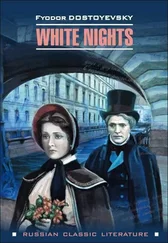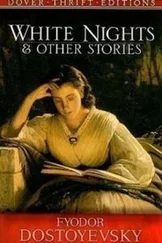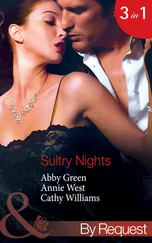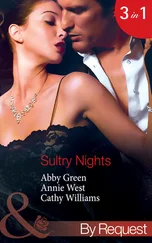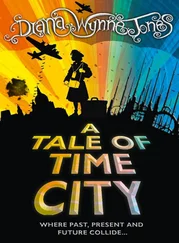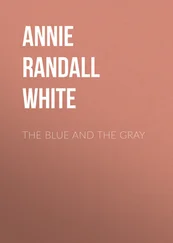Annie DeWitt - White Nights in Split Town City
Здесь есть возможность читать онлайн «Annie DeWitt - White Nights in Split Town City» весь текст электронной книги совершенно бесплатно (целиком полную версию без сокращений). В некоторых случаях можно слушать аудио, скачать через торрент в формате fb2 и присутствует краткое содержание. Год выпуска: 2016, Издательство: Tyrant Books, Жанр: Современная проза, на английском языке. Описание произведения, (предисловие) а так же отзывы посетителей доступны на портале библиотеки ЛибКат.
- Название:White Nights in Split Town City
- Автор:
- Издательство:Tyrant Books
- Жанр:
- Год:2016
- ISBN:нет данных
- Рейтинг книги:5 / 5. Голосов: 1
-
Избранное:Добавить в избранное
- Отзывы:
-
Ваша оценка:
- 100
- 1
- 2
- 3
- 4
- 5
White Nights in Split Town City: краткое содержание, описание и аннотация
Предлагаем к чтению аннотацию, описание, краткое содержание или предисловие (зависит от того, что написал сам автор книги «White Nights in Split Town City»). Если вы не нашли необходимую информацию о книге — напишите в комментариях, мы постараемся отыскать её.
Annie DeWitt
Granta
Believer, Tin House, Guernica, Esquire, NOON
BOMB, Electric Literature
American Reader
Short: An International Anthology
Gigantic
Believer
White Nights in Split Town City — читать онлайн бесплатно полную книгу (весь текст) целиком
Ниже представлен текст книги, разбитый по страницам. Система сохранения места последней прочитанной страницы, позволяет с удобством читать онлайн бесплатно книгу «White Nights in Split Town City», без необходимости каждый раз заново искать на чём Вы остановились. Поставьте закладку, и сможете в любой момент перейти на страницу, на которой закончили чтение.
Интервал:
Закладка:
When I played, Otto Houser said he had the feeling that he was glimpsing some rare, unidentified talent. He observed me from across the road. The details of the piece, he said, he could not discern at his precise distance. From his place on the porch, unable to hear the sounds I made, he watched instead for some forward thrust in my body to suggest the recurrence of a chord or the emergence of melody. He particularly admired those passages where the thin waft of one of my arms eagled-out as it ran up and down an octave. Otto enjoyed those segments of the old television variety hours that featured some new emerging talent, often a corn-fed, blond-haired youth with his or her sights set on the big city lights. These displays of talent produced a rising in Otto’s chest, he said. Their fame nearly embraced him.
On the warmer days, I played in the mornings before the sun was already on us. One noon after practice I went out into the yard to get the mail. Otto Houser was sitting in a rusty beach chair he’d brought onto his porch. Later, once I’d come to know him, he said when the sun was overhead and the shade was right, he liked to sit under the cover of the veranda and eat peanuts while he watched me play. He liked to suck the salt off the shells.
“Hey, Hotshot,” Otto called across the road to me the first afternoon we spoke. I turned to look at him. It was the first time I had known a man to notice me. I could see my reflection in the window at his back. There wasn’t much curve to me. Twelve going on thirteen, I’d grown four inches that year. My chest was still flat. I hadn’t yet embodied the weight of the world, as Mother said. I fumbled with the mail. One of the envelopes slipped off the top of the stack.
“You missed a note,” Otto said.
3
Early that summer, Mother took a vision of England under her wing. She fell in with Margaret Nydam, the elderly British widow who lived in the studio apartment above the Agway in the center of town. Margaret was Fay Mountain’s only living European transplant. Along with her accent and her collection of Yeats, Margaret boasted purebred old world blood. The Women’s Voting League congregated in her parlor every Sunday where Margaret served scones and cream. Father often called Margaret cultural driftwood. Her influence, he said, floated wherever it was least needed. She was also the town librarian.
Most mornings that summer I awoke to Margaret sitting on the wooden stool next to our kitchen counter where Mother sat when she sorted the bills. Margaret sipped a black coffee. Mother would put out a spread until Margaret chided her enough that she’d finally retire to the table with her cigarette and tea. Mother was constantly extending the life of her teabag with fresh water until the brew was so weak it tasted like a river of stirred up silt. “One of anything goes a long way,” she said.
Margaret arrived in the early hours cloaked in layers of felt and flannel and an old safety pin where she’d thrown up her bangs. Layers, Margaret said, trapped the breeze. A husky body odor emanated from the places where Margaret exposed her pallor to the light. Due to her age and thickness of her hair, the oils made her face glow and gave her hair body. Her long unkempt grays were braided to one side her face. Margaret was not in the habit of wearing undergarments. I had glimpsed her breasts once where they hung away from her skin as she bent over to adjust her stool and pour herself another trifle from her flask. The immodesty of my gaze seemed to impress her.
That morning, the two women were hanging a painting in the kitchen above Old Eagle Back. Margaret sat on the stool observing Mother work.
“What about here,” Mother said, holding the painting at shoulder level against the far wall of the kitchen. “How’s that for height?”
“That’s fine,” Margaret said. “That’s just fine. Mark it off. I’ve got a level in back of the car. I’ll make a dash for it after we finish our tea.”
Mother took the pencil from behind her ear and drew a faint line on the wall over the center of the frame.
The wall had been a focal point of Mother’s recent discomfort. It sat at the far end of the house onto which both the living room and the portico overlooked. The previous owners of the house had been an elderly couple with a fondness for stenciling pastoral scenes onto any stretch of wall that enjoyed some open expanse. To Mother’s mind, the kitchen offered a particularly unforgivable example. The laymen’s handiwork, she felt, was evidence of the house’s age and limited possibility.
“Like Didion said,” Margaret said. “Style is character.”
“Truly,” Mother said. She leaned the print against the wall and stood back to regard it as she smoked.
In truth, I could tell Mother wasn’t entirely sure about the choice of the work. The print had been a gift from Margaret, an old replica from her wall, which Margaret said she’d stared at too long.
“It needs fresh eyes,” Margaret had said, putting the frame into the back of her Volvo one night after the two women had gotten into the sherry.
Mother looked disappointed now with her choice. She’d hoped for something more modern. In the wake of their enthusiasm, she’d ended up with Georgia O’Keeffe’s “Red Hills.”
“There’s a hardness about it,” Margaret said. “It radiates a certain intelligence.”
Mother searched the soft red expanse of the print for the intelligence of which Margaret spoke. In her worst imaginings, I thought, the earthen mass looked not unlike one of the watercolors Birdie would bring home from school. At best, it radiated a kind of optimism.
“It’s a horizon,” Mother said.
“Not only that,” Margaret said. “It’s Texas.”
“Really,” Mother said.
“Truly,” Margaret said. “O’Keeffe attended art school in Chicago. The boys there were always encouraging her to abandon her practice and become an art teacher or a live model. One even went so far as to paint over her work to show her how the Impressionists made trees. At twenty-four, O’Keeffe said she moved to Texas because there were no trees to paint.”
“In that case I understand her prerogative,” Mother laughed dragging long and hard on her cigarette before pushing the smoke out her nose.
“When they got too bored of looking at the horizon,” Margaret said. “O’Keeffe and her sister, Claudia, used to go out and trace the evening stars. They’d take long walks and Claudia would play skeet with the bottles in the road, throwing the bottles up into the air and picking off as many of them as she could before they hit the ground.”
“Don’t tempt me,” Mother laughed.
“You’re a funny woman, Ania,” Margaret said to Mother. “In fact, you’re not so unlike Didion yourself.”
“Come off it,” Mother said by way of encouragement.
“Scout’s honor,” Margaret said. “When the men asked her why she painted ‘Red Hills’ instead of her traditional flowers, O’Keeffe replied, ‘A red hill doesn’t touch anyone’s heart.’”
Mother wasn’t much versed in the ways of Didion. She associated writers of that ilk with the allure she had felt towards the women’s movement that had erupted during her college years. The product of Russian immigrants who had raised their family in a small boarding house in one of New York’s smaller industrial cities, she had avoided her attraction to the movement for practicality’s sake. Her mindset was the product of the immigrant constitution. She’d been taught to keep her brow tipped slightly toward the heavens at all times such that her very posture might raise her up. While her grade school friends were tattooing their books with pictures of Kennedy, she’d attended Republican meetings with her father at the General Electric. The first vote she’d cast had been for Nixon. From a young age she’d wanted to be a part of the American politic, a forecast she associated with the Republican brain. Republicans belonged to a set of wealthy risk-takers with strong characters who made good on their children and their investments. “The future is portended in the rise of one’s cheekbones,” Mother often said. “That slender slope.” Mother had spent one summer of her college career working desk duty at the addictions division of the Red Cross, conducting intake interviews with the Veterans. She’d felt she’d seen enough that summer to know big government didn’t accomplish anything more than organizing people’s worst years.
Читать дальшеИнтервал:
Закладка:
Похожие книги на «White Nights in Split Town City»
Представляем Вашему вниманию похожие книги на «White Nights in Split Town City» списком для выбора. Мы отобрали схожую по названию и смыслу литературу в надежде предоставить читателям больше вариантов отыскать новые, интересные, ещё непрочитанные произведения.
Обсуждение, отзывы о книге «White Nights in Split Town City» и просто собственные мнения читателей. Оставьте ваши комментарии, напишите, что Вы думаете о произведении, его смысле или главных героях. Укажите что конкретно понравилось, а что нет, и почему Вы так считаете.
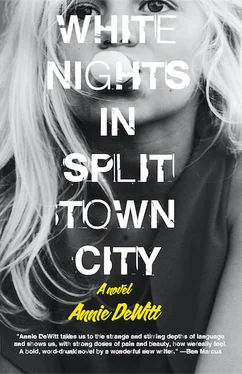
![Элизабет Ленхард - Свидание со смертью[Date With Death]](/books/79651/elizabet-lenhard-svidanie-so-smertyu-date-with-dea-thumb.webp)



